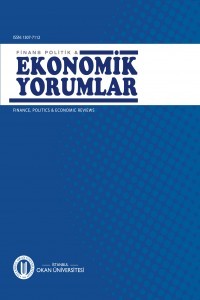Bölgesel Kalkınmada Dış TicaretSektörünün Rolü ve Sorunları: BatıAkdeniz Bölgesi Örneği
Batı Akdeniz Bölgesi, Türkiye’de gayri safi katma değer sıralamasında altıncı sırada olmasına rağmen Türkiye ihracatının sadece %1’ni gerçekleştirmektedir. Bu çalışmanın amacı, Batı Akdeniz Bölgesi’nde ihracat yapan 55 firmaya uygulanan anket yardımıyla, Batı Akdeniz Bölgesi’nin ihracatı geliştirme sürecinde yaşadığı sorunları tespit etmektir. Çalışmanın ilk bölümünde bölgesel kalkınma politikalarına ihtiyaç duyulmasının nedenleri ve bir bölgede ihracat artışlarının bölgesel kalkınmaya faydaları incelenmiştir. Anket sonucunda Batı Akdeniz Bölgesi’nde firmaların ihracatı geliştirme sürecinde yaşadıkları problemlerin sırasıyla, uluslararası siyasetteki olumsuz gelişmeler, döviz kurundaki hareketlilik, yüksek maliyetler ve uluslararası reklam eksikliği olduğu tespit edilmiştir. Ayrıca firmaların çalışan sayısı ve ihracat yaptığı ülke sayısı ile bu sorunlar arasında, istatistiksel olarak anlamlı bir farklılık bulunamamıştır.
Anahtar Kelimeler:
Bölgesel Kalkınma, Dış Ticaret, Batı Akdeniz Bölgesi, Anova Testi.
The Role and Problems of Foreign Trade Sector in Regional Development: Evidence from West Mediterranean Region in Turkey
West Mediterranean Region is in the 6th place in the gross value added ranking in the 6th place, however it accounts for only 1% in Turkey’s exports. The purpose of this study is to identify the problems that the West Mediterranean Region has experienced during the export development process with the help of a survey conducted to 55 exporting companies in this region. In the first part of the work, the reasons for the need for regional development policies and the positive impact of export on of regional development have been examined. We have detected through the survey that problems that firms in the West Mediterranean Region have experienced in the export development process are negative developments in international politics, exchange rate volatility, high costs and lack of international advertising, moreover, there was no statistically significant difference between the number of employees and the number of exporting countries and these problems.
___
- ARSLAN, Kahraman; (2005), “Bölgesel Kalkınma Farklılıklarının Giderilmesinde Etkin Bir Araç: Bölgesel Planlama ve Bölgesel Kalkınma Ajansları”, İstanbul Ticaret Üniversitesi Sosyal Bilimler Dergisi, Yıl:4, Sayı:7, Bahar 2005/1, ss. 275-294.
- BAKA; (2014), Batı Akdeniz Dış Ticaret Analizi 2002-2013, Aralık.
- BAKA; (2016), Batı Akdeniz Bölgesi Ekonomik Göstergeler, Mart.
- BÜYÜKÖZTÜRK, Şener; (2007), Sosyal Bilimler İçin Veri Analizi El Kitabı, 7.Baskı, Pegem Yayıncılık.
- COOKE, Philip and Loet LEYDESDORFF; (2006), “Regional Development in the Knowledge Based Economy: The Construction of Advantage”, The Journal of Technology Transfer, January, 31(1), pp. 5-15.
- CRESCENZİ, Riccardo and Andres Rodriges POSE; (2011), “ Innovation and Regional Growth in the European Union”, Advanses in Special Science, Springer Verlag Berlin Heidelberg.
- ÇINAR, Yetkin ve GÖKSEL Türkmen; (2010), “İhracatta Bölgesel Çeşitlendirme ve İstikrar”, Ankara Üniversitesi SBF Dergisi, 65(2), ss. 29-57.
- DANIŞMAN, Ali ve Ahmet Gökhan SÖKMEN; (2007), “Girişimci Özellikleri Ve Firma Niteliklerinin İhracat Performansına Etkisi: Kobi’ler Üzerinde Bir Araştırma”, Çukurova Üniversitesi Sosyal Bilimler Enstitüsü Dergisi, 16(1), ss. 213-230.
- DPT; (2000), “Uzun Vadeli Strateji ve Sekizinci 5 Yıllık Kalkınma Planı”, http://ekutup.dpt.gov.tr/plan/viii/plan8str.pdf
- ERSUNGUR, Mustafa Ş. ve İlkay Noyan YALMAN; (2009), “ Bölgesel Kalkınmada İhracat Teşviklerinin Etkinliği: Sivas İlinde Bir Uygulama”, Cumhuriyet Üniversitesi İktisadi ve İdari Bilimler Dergisi, 10(1), ss.81-98.
- GÖÇER, İsmet ve Bekir ELMAS; (2013), “Genişletilmiş Marshall-Lerner Koşulu Çerçevesinde Reel Döviz Kuru Değişimlerinin Türkiye’nin Dış Ticaret Performansına Etkileri: Çoklu Yapısal Kırılmalı Zaman Serisi Analizi”, BDDK Bankacılık ve Finansal Piyasalar, 2013, 7(1), ss. 137-157.
- GÖK, Abdülkerim; (2012), “Bölgesel Kalkınmanın Dış Ticaret Etkisi Ve Gap Örneği”, Türkiye Ekonomi Kurumu Tartışma Metni, http://www.tek.org.tr/dosyalar/gap5.pdf.
- KALAYCI, Şeref; (2005), SPSS Uygulamalı Çok Değişkenli İstatistik Teknikleri, Asil Yayın Dağıtım, 1.Baskı, Ankara.
- KALKINMA BAKANLIĞI; (2014), “Onuncu Kalkınma Planı İthalata Olan Bağımlılığın Azaltılması Programı Eylem Planı”, Ankara.
- KEBAPÇI, Hasan; (2011), “Bölgesel Kalkınmada Dış ticaretin Rolü: Burdur-Isparta-Antalya İllerinin Karşılaştırılması”, Yayınlanmamış Yükseklisans Tezi, Süleyman Demirel Üniversitesi Sosyal Bilimler Enstitüsü, Isparta.
- KUMRAL, Neşe; (2008), “Bölgesel Rekabet Gücünü Artırmaya Yönelik Politikalar”, Ege University Working Papers in Economics, 08(02), ss. 1-14, http://iibf.ege.edu.tr/economics/papers/ wp08-02.pdf.
- LEYDESDORFF, Loet and Henry ETZKOWITZ; (2003), “Can ‘‘The Public’’ Be Considered as a Fourth Helix in UniversityIndustry-Government Relations?”, Report of the Fourth Triple HelixConference, http://www.leydesdorff.net/th4/spp.htm.
- MACKİNNON, Danny, CUMBERS, Andrew and Keith, CHAPMAN; (2002), “Learning, Innovation And Regional Development: A Critical Appraisal Of Recent Debates”, Progress in Human Geography 26(3), pp. 293-311.
- MATTHEE, Marianne and Wim NAUDE; (2007), “Export Diversity and Regional Growth: Empirical Evidence from South Africa”, Research Paper, UNU-WIDER, United Nations University (UNU), https://www.econstor.eu/dspace/bitstream/10419/63393/1/526138939.pdf.
- MORGAN, George, A., Nancy. L. LEECH, , GLOECKNER, Gene. W and, Karen. C. BARRET; (2004), Spss for Introductor,.Statistics: Use and Interpretation. Second Edition. London, Lawrance Erlbaum Associates
- ISSN: 1307-7112
- Başlangıç: 1963
- Yayıncı: İstanbul Okan Üniversitesi
Sayıdaki Diğer Makaleler
Yoksulluğu Önlemeye Yönelik Sosyal Bütçe Uygulamaları ve Türkiye Açısından Değerlendirilmesi
Kâmil TÜĞEN, Abdulkerim EROĞLU
İç Borçlanma, Enflasyon ve Ekonomik Büyüme: Türkiye için Ekonometrik Bir Uygulama (1980-2014)
Bölgesel Kalkınmada Dış TicaretSektörünün Rolü ve Sorunları: BatıAkdeniz Bölgesi Örneği
